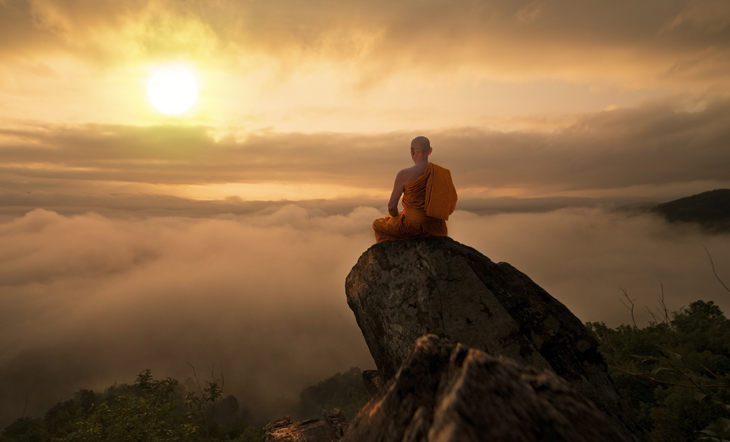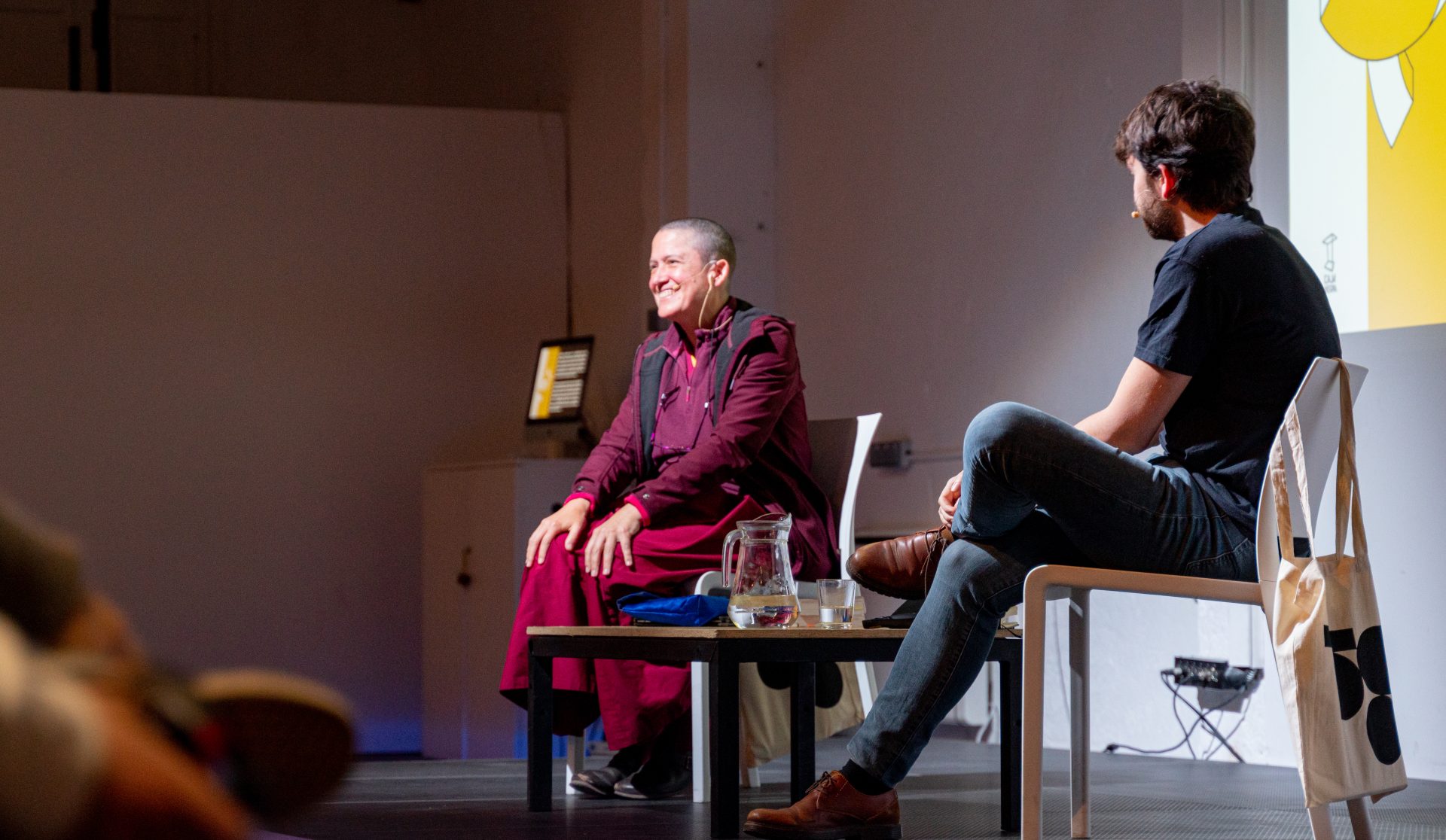Ancient Wisdom Says You Will Find Peace By Releasing These 2 Things
In your practice of mindfulness, pay attention to how often you judge other people and the world. Surely it robs you of living a happy, peaceful life? When I started bringing my personal judgments into awareness, I was amazed...

In your practice of mindfulness, pay attention to how often you judge other people and the world. Surely it robs you of living a happy, peaceful life?
When I started bringing my personal judgments into awareness, I was amazed at how often I do this! In my mind, I determine a boundary between right and wrong, and then I look out to the world. All too often, it doesn’t fit into my boundary.
As the Buddha once said, “With our thoughts we create the world.”
It’s a curious practice. After all, the world and other people owe us no favors. Nor are they aware they are standing trial in the courtroom of justice in our minds, stealing our peace.
They’re like athletes that step out of bounds from a line they can’t see, in a game they didn’t know they were playing.
10-Minute Guided Mindfulness Meditation for Peace + Presence
What chance do the judgments have to satisfy our expectations? For that matter, are we even seeing the world objectively? Or are we filtering the world through the prism of our selfish personal perspective?
Ancient Wisdom Teaches Us How to Live a Happier, More Peaceful Life
The Yogic tradition teaches the Five Yamas, one of which is Ahimsa – the non-violence of our thoughts, words and actions. Failure to practice Ahimsa can lead to violent thought – in other words, our judgements.
Sometimes we indulge in violent thoughts, believing it’s ok so long as we don’t act on them further. But this doesn’t really work. Violent thoughts are seeds that sprout into violent words and actions. Even if you bury them inside, they will manifest.
Have you ever experienced being in a room with another person who was angry at you? You can feel that, right? Spiritual energies are our true nature. And when you sully your mind with intolerance, those energies permeate the space around you and within you.
In Buddhism, a great emphasis is likewise placed on our thoughts. As the Buddha once said, “With our thoughts we create the world.”
An Introduction to Buddhism, The Four Noble Truths, and The Eightfold Path
Buddhism advises we must disempower our selfish view of the world to maintain a broader and more objective view of reality.
Venerable Master Hsing Yun’s Core Teachings quotes The Treatise on Awakening of Faith in the Mahayana as saying, “it is only because of delusions that there are distinctions. Away from delusion, all that is left are things as they are.”
In other words, if you spend your whole life experiencing the world based on how it meets (or fails) your needs, then you’re destined for a life of delusion and suffering.
As already mentioned, the world owes you no favors. Everything will fall into the categories of “good” or “bad,” depending on the framework you’ve constructed in your mind.
Buddhism recommends another path towards a peaceful life. Release your judgments of good and bad, and just see the world for what is. In this way, we open ourselves to practice compassion, rather than clinging to mental narratives preaching intolerance.
We also free ourselves from the suffering these mental narratives weigh upon us. As the Venerable Ajahn Chah of the Thai Forest Tradition once wrote, “When the mind is radiant and has given up evil, there is always ease.”
Summing this up, our personal judgements create suffering for ourselves, suffering for others, and are not guaranteed to be true. Where is the trap door to escape this tendency?
When you find yourself walking this path of judgement, consider the following five interventions to brighten your experience and create a more joyous, peaceful life.
Follow These 5 Steps to Live a More Peaceful Life:
1. Deepen Your Awareness
Before you can evolve, you have to see yourself for what you’re doing. This is the importance of present moment awareness.
Be on the lookout for the oil spills of judgement as they pollute your mind. But don’t condemn yourself for these oil spills, and don’t try to clean them up. You won’t transcend a selfish habit by running away from it.
Observe your judgments so you can understand them fully. Ask yourself why you’re feeling so intolerant? What are you scared of? What desires are left unfulfilled? Understanding these fears and desires points to the path of understanding ourselves.
2. Relax
Become aware of your body posture. Are you clenching your fist? Your jaw? Are you tightening your stomach? Are you walking fast?
Find a way to let go and slow yourself down. Bring your attention to your breath. Breathe deeply at a comfortable cadence and allow your body to soften. This creates the space you need to define yourself to life, rather than allowing life to define you.
Practice These 7 Relaxing Yoga Poses to Quickly Calm Your Body and Mind
3. Maintain an Objective Perspective
If you think your friend is doing something selfish, that very well might be true. But if you characterize your friend as a selfish person, this would be ignorance.
Buddhism speaks of an impermanent ever-changing world, and that includes each one of us. Therefore, people cannot be defined by what they have done, but only what they are doing right now.
If you choose to see someone as inherently bad, then you will seek out evidence to support that conclusion.
And so doing, you might overlook their moments of greatness. And robbing yourself of a happier, more peaceful life.
This is how our selfish judgements operate – we don’t understand the world for what it really is, but rather what we want to believe. Try to avoid this. Allow every person an opportunity to define themselves to the present, and recognize them as such.
Let go of whatever happened in the past. So long as you carry it forward, it will continue to cause you suffering.
Okay Buddha, Let’s Talk About the Third Noble Truth and What Brings an End to Our Suffering
4. Practice Gratitude
If you’re still having trouble with judging other people, try listing out their positive qualities and notice how it creates more happiness and inner peace.
Perhaps your friend’s lazy easygoing nature can be a burden, but can it also be a blessing? If they’re annoying you right now, when was the last time they made you smile or laugh?
When your mind walks down the path of intolerance, listing the positive qualities of other people can slice through the negative energies these judgements create.
This Is Your Brain on Gratitude: 9 Benefits of Practicing Gratitude
5. Realize the Joy of Letting Go
The last step to cultivate a peaceful life is simple and profound. Once you see how happy life can be when you live free of judgement, you won’t want to return to your old habits.
See What Is and Live a Happier, More Peaceful Life
Imagine if Thomas Edison had invented the light bulb before he studied electricity. By forcing electricity to obey his design, would Edison have succeeded in harnessing the power of light?
But of course Edison studied electricity first, and built his light bulb around its tendencies. Using this approach he illuminated the world.
So if you want to illuminate your world, do not squeeze other people into your framework of right and wrong. Rather, study the world and other people and understand them for what they are.
This requires setting aside your selfish expectations for what SHOULD be, and focusing on what IS. Once you can see the world clearly, you’ll realize everyone has their moments of greatness and weakness, just like everything else (including you!)

 Hollif
Hollif 

























.jpg&h=630&w=1200&q=100&v=f776164e2b&c=1)






